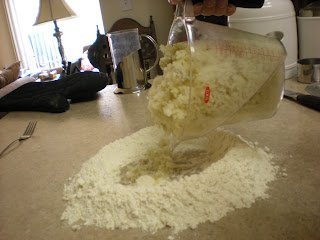I'm talking about decision making.
Yes, I'll explain.
I know, through years of grooming, that I am supposed to eat balanced meals. Meals with protein. Meals with vitamins. Meals with more than one item. (I also know this through nights of eating just cookies for dinner. That is a no go.)
Alas, this knowledge is not changing my behavior because...
I made gnocchi.

Gnocchi, the delicious potato-y pasta that says, "Hey, you can have a square meal if you think those vitamins will keep you warm at night, but you'll be dreaming of me."

It says that, really. You might need to listen closer to yours next time.

Either way, when the gnocchi are in the house, all this "knowledge is power" mumbo-jumbo gets kicked to the curb. You just want carbilicious gnocchi.
Or, maybe you're like me, and you want gnocchi with butter. And butter is dairy, so there you go.
Here's how you make 'em.
I learned how to make gnocchi from my dad's mom a few years ago. I have since added some "tips and tricks" that I have learned since then that are part of the sacred gnocchi-making strategy.
First, set your oven to 400 degrees Fahrenheit and let it get hot. In the meantime, turn off your air conditioner. If you have both running at the same time, it means you are a millionaire and can pay someone else to make gnocchi for you. I might be available for this job.
Prep some potatoes for cooking by scrubbing them down, drying them well and poking them with forks. You'll need about 5 cups of cooked potatoes for this recipe, and with my little potatoes that meant about 7 (the rest are for later in the week).
Lay the spuds out onto a cookie sheet covered in salt. The salt helps draw moisture out of the potatoes, which is something you want when making gnocchi but no one ever tells you.

Cook the potatoes for about 45 minutes to an hour until there is very little give when you stab them with a fork. They should be wrinkly and sad-looking. This is a sign of success.
Take the potatoes out and let them cool a little before touching. No food is worth second-degree burns.
While the potatoes are still warm (but not hot!), peel off their skin.

Cut the potatoes in half.

Half a potato at a time, work the spuds through your ricer.
This is a ricer.


These are the potatoes going through the ricer.

Don't be scared of the ricer.
The ricer is important because it keeps some of the natural texture of the potatoes. A potato masher would destroy all of your hard work, giving you very dry mashed potatoes that could only be remedied with heavy cream and a nice, juicy steak.
The ricer is your friend. However, if you don't have a ricer, you could push the cooked potatoes through a colander like I used to when I was first learning how to make gnocchi. You'll look ghetto, but remember: you are not running your air conditioner and oven at the same time. No one thinks you're Daddy Warbucks.
When you've collected your 5 cups of ricerized potatoes...

...turn them out onto the counter into 3 cups of flour.

Your instincts will make you feel that this is wrong, that a bowl should be involved. Actually, this is the best way to do it.

Add one egg and a pinch of salt...

and mix these with your hands until a dough forms.
Not quite.

There you go.

This is the reason for bowl-less-ness. Mixing the dough this way will help ensure you don't add more flour than is needed. The dough will take what it needs, so don't force too much flour onto it. Show it some respect.
At this point in the recipe, you could add things like finely-minced garlic, Parmesan cheese, or fresh or dried herbs to the dough for a little zing.
But I don't have time for that. I need gnocchi now.
With a 7 out of 10 on the "reckless abandon" scale, pull off small patches of dough...

...and roll them into thin ropes on a floured cutting board. Cut 1-inch pieces from the rope and roll them up onto a fork.

This makes that little gnocchi sauce "well" everybody is always talking about. The well is important.
Seriously, just flick them up the fork.
My wells are satisfactory, which is good enough for me.

At this point, you have a couple options. The first is boiling up some water in your favorite pot and going to town. When the gnocchi float to the top, they're ready to eat.

It is very likely, though, that you cannot eat all of this pasta in one sitting (as hard as you might try). The other option is to lay the gnocchi out on a clean cookie sheet and freeze them. After completely frozen, you could store them in freezer bags. You can also cook the gnocchi straight from the freezer, too; again, when they float to the top of the pot after being thrown into boiling water, they're ready to eat.
Me? Well....

P.S. Here's somebody making gnocchi with Gorgonzola--yum!